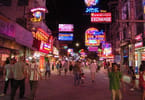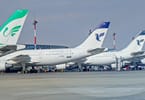Global financial crisis and swine flu are blamed for the recession of the world tourist industry, experts said at a tourist seminar held in HCM City on Sep. 11.
The seminar, “Capacity building for Vietnam’s tourism businesses against the backdrop of the global financial crisis,” was held to discuss lessons and recommendations for local tourism businesses to improve their capacity.
It welcomed presentations by various well-known and experienced lecturers from regional countries.
The morning schedule included a seminar “Asia Pacific’s tourism trends” by Kris Lim, Associate Director of the Strategic Intelligence Center (SIC) under the Pacific Asia Travel Association.
This was followed by a discussion about innovation in product development by Dr. Victor Wee (photo), Chairman of program Committe of the UN World Tourism Organization.
In the first presentation, Mr. Lim highlighted the case that most countries in the world have experienced a negative drop in their tourism industries since last year’s fourth quarter.
He cited the World Tourism Organization, which had reported a 1.9 percent increase in international visitor arrivals in 2008 and forecast a more than four percent contraction in 2009.
The two main suggested factors for the situation were the global financial crisis and swine flu.
Other minor reasons are believed to be the slow development of the cruise-liner and airline sectors and the impact of climate change.
However, the SIC director noted that the Asia-Pacific region had suffered less than most, with the worst drop being ten percent, compared to the Americas’ record of more than 15 percent, both in May 2009.
Discussing Vietnam in particular, the presentation reviewed a negative fluctuation since its second quarter in 2008. From 1.3 percent increase in the total arrivals in the second quarter, tourism industry quickly saw a slump at negative 9.6 percent in the third quarter, but slightly improved at negative nine percent in the last quarter of 2008.
The fluctuation continued during the first seven months of 2009, with the bottom recorded a drop of 28.6 percent. In an effort to get its head above water, the industry managed to stem the fall to 10.1 percent in June. But, in the next month, the collapse continued, with a 17.8 percent at loss.
The two exceptions to the region’s tourism woes and have shown a rising trend are South Korea and Malaysia.
While discussing Republic of Korea, Mr. Lim proposed two main factors to help Korean tourism maintain its healthy growth, including depreciation of the Korean Won and impressive tourist packages for the Japanese market.
However, Mr. Lim did not recommend the first proposal for other countries, especially Vietnam, as he thought the idea is a two-edged sword.
In explanation, he said the number of tourists bound for Republic of Korea could be very impressive during the first four months of the year but in return, the number of Koreans leaving the country could drop, as overseas trips would become more expensive.
Discussing the Malaysian tourism industry, Dr. Wee believed the three most-helpful actions were to research and draw the attention of countries who had either not suffered or were suffering less from the financial crisis, especially the Middle-East and Iran; diversify its markets and applying different products for different market segments; and give cut-price promotions to increase demand from both local and foreign visitors.
Answering a question by a participant about solutions for Malaysia and whether they fit the Vietnamese situation, Dr. Wee suggested Vietnamese tourism officials to carry out more promotion packages.
He also recommended a stronger cash injection from the Government to stimulate local businesses, as “once they feel confident again, they will start to invest more in the industry.”
Malaysian tourism experts gave tips for local tourism agencies, including extensive use of technology such as the Internet, create more value-added services, consider brand extension in promotions, focus on niche products such as youth travel, music and sports, volunteer tourism, eco-tourism and gastronomic tourism, strategic alliances, using icons as a marketing strategy and celebrity endorsement.
The last tip from Dr. Wee was to solve obstacles for most foreign investors in Vietnam. He admitted that governments in most of the region’s countries have limited budgets for public services. As a result, they only provide basic infrastructures for their countries. Banks are the partners and also the agent for hesitance by most investors.
“While investors await special treatment from banks for their tourism project, most banks do not welcome such business, with loans for tourism projects quite difficult to get and interest rates for such loans being quite high. In Malaysia, the banks provide a special loan, a ‘soft loan,’ for tourism projects with the preferential rates. Vietnam should consider this method.
“In addition, the Government should clear procedural mess and make procedures more practical and easy for foreign investors,” Dr. Wee added.
The seminar will continue during the afternoon with two presentations, including “Tourism recovery – BOOST” by Chi Chuan, from the Singapore Tourism Board, and “The impact of visas on tourism and investment” by Baron Ah Moo, CEO of Indochina Land Management Vietnam
WHAT TO TAKE AWAY FROM THIS ARTICLE:
- In explanation, he said the number of tourists bound for Republic of Korea could be very impressive during the first four months of the year but in return, the number of Koreans leaving the country could drop, as overseas trips would become more expensive.
- Malaysian tourism experts gave tips for local tourism agencies, including extensive use of technology such as the Internet, create more value-added services, consider brand extension in promotions, focus on niche products such as youth travel, music and sports, volunteer tourism, eco-tourism and gastronomic tourism, strategic alliances, using icons as a marketing strategy and celebrity endorsement.
- He also recommended a stronger cash injection from the Government to stimulate local businesses, as “once they feel confident again, they will start to invest more in the industry.






















